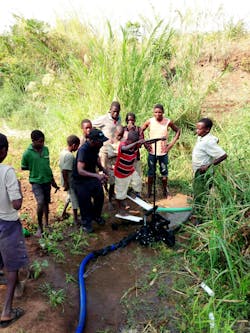Pumping for Prosperity
About the author: Keith Teichmann is director of innovative networks and marketing for Xylem Inc. Teichmann can be reached at [email protected] or 978.282.5214.
Not all farmers have the newest tractors, advanced watering technologies and thousands of acres of prime tilling soil. This substantial group — the smallholder or subsistence farmers — deserves greater attention. They number 1.5 billion across the globe, from remote villages in Central America and sub-Saharan Africa to the onion fields of India. The average smallholder farmer owns 5 acres of land or fewer. These meager plots produce only marginal amounts of food annually, which, when used for revenue generation, places this group of rural farmers at the base of the economic pyramid.
In need of assistance, these farmers often turn to government and philanthropic organizations to help them increase crop yields, simplify workload and increase profits. The results of this aid can extend beyond the farmers and their families. According to a study conducted by the World Bank, cross-country economic estimates show that overall gross domestic product growth originating in agriculture is, on average, at least twice as effective in benefiting the poorest half of a country’s population as growth generated in nonagricultural sectors, underscoring the importance of rural farming.
Farmer as Customers
Recognizing the economic impact these farmers could have on global agricultural prosperity, businesses are becoming involved in solutions to improve farming for this group. Smallholder farmers are customers of agriculture, seeking products, services and training to help them advance their businesses. They are willing to pay a premium for quality products targeted to specific needs.
When it comes to irrigation systems and water pumps, there is opportunity to best serve this customer group with original products developed to meet those needs, instead of providing modified products that may not connect as strongly with them.
Research for Sustainable Results
Xylem Inc. recognized this customer group and set out to conduct extensive research that included more than 800 interviews in rural communities across India, Africa, Asia and South America. The interviewers wanted to know which irrigation products or services could best suit these farmers’ needs.
In addition to voice-of-customer research, the company conducted socioeconomic mapping of water use and poverty level, tracking them relative to access to water management technologies, applications and storage methods.
The company also employed pretotyping, an approach to developing and launching a product that helps determine whether what it is building is appropriate before investing time and effort. Pretotyping was essential to beginning water pump testing; more than 60 pretotype pumps were deployed across India, Asia, South America and Africa, supported by multiple technology demonstrations. Pretotyping also set the stage for appropriate prototyping. Multiple product design iterations were fielded to check the veracity of improvements and modifications with farmers directly, in-field and during cropping cycles.
The research uncovered exactly what these farmers were looking for in an irrigation tool, which included labor and time reduction, output maximization, a focus on design and quality, in-field serviceability, and the ability to integrate directly with efficient crop irrigation methodologies.
The Birth of a Pump
Using that knowledge, the Saajhi stepping pump, a field-serviceable pump that efficiently irrigates crops by drawing water from a nearby source and transporting it to crop fields for irrigation, came to life. The pump gives farmers the ability to use 40% less water than traditional furrow irrigation, saving resources and time. Its design requires no fossil fuels, electrical connections or standing power supply, making it suitable for use in even the most remote areas.
The Saajhi features diaphragm pump technology, which is a flexible, self-priming system that allows for an optimal human-movement-to-water-output ratio for efficient water delivery. As research showed that labor reduction was a key feature, the pump leverages human weight, gravity and a strict focus on human factors designed to move water, putting less strain and stress on the operator. This gives farmers the freedom to accomplish more tasks within a day, because they are not only finishing their work more quickly, but also more efficiently.
To ensure the product withstands the rugged terrain where these smallholder farmers operate, the pump is manufactured with low-carbon steel and glass-reinforced polypropylene — strong materials that ensure durability and reliability. Requiring no tools for servicing, the portable pump can be easily transported for farmers with multiple plots of land. All components are modular, replaceable, and enhanced for extended wear and harsh conditions.
By using this product, farmers can realize up to three times greater crop yields compared with relying on rain-fed fields. Ultimately, this product ensures the farmer provides for his family and community: The more food he produces, the larger his income.
Adding Value
The Saajhi is sold through Xylem’s Essence of Life (EOL) initiative, which provides solutions for rural farmers. EOL works with local nonprofit groups, businesses and government partners to develop innovative products and solutions as a way to build a strong support system for farmers. These partnerships and products help EOL teach, guide and connect with the smallholder farmer as a valuable customer base to help advance local economies and drive sustainable enterprise.
Focusing on turning subsistence farmers into business-savvy entrepreneurs who responsibly manage water not only improves these rural communities, but also has a ripple effect on neighboring cities, states and countries. Providing sustainable water management tools and improving agriculture play a large role in poverty reduction.
By equipping farmers with the right tools to properly tend their crops, rural poverty can be reduced, ensuring a prosperous future for the billions of workers who head out to the field each day.
Download: Here
